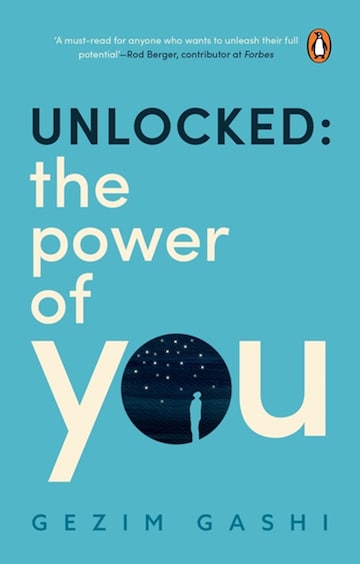
Gezim Gashi has a remarkable story. Born in Pristina, Kosovo, in 1990, he was thrown out of a second-floor hospital window by his mother to escape the genocide three days after his birth when their parliament declared independence from Serbia, prompting a military invasion.
Today, having worked with giants such as the Walt Disney Company and Quincy Jones Production, he is the first Albanian-Swede to ever launch a high school institute focused on arts and innovation in the United States. Through his book Unlocked: The Power of You, he shares his incredible story in the hope that it will encourage you to look at yours and work at it.
In this exclusive interview, Gashi, who grew up in Alvesta, Sweden, and currently lives in the United States, discusses the book, The Modern Living Paradox, his hack to finding inspiration, the growing popularity of the self-help genre, and gives valuable insight on how you can live better, fuller, and happier.

Q. Historically, humans have never been more comfortable and yet, we need motivation more than ever before just to go through the day. Where did we go so wrong?
A. In recent history, humans have made remarkable advancements in technology and improved living conditions, which have undoubtedly increased our overall comfort and convenience. However, this increased comfort has come with unintended consequences for our motivation and well-being.
One key factor contributing to this phenomenon is the reduction in physical challenges that were once inherent in daily life. In the past, individuals had to exert significant physical effort for tasks like farming, hunting, and manual labour, which naturally provided a sense of purpose and achievement. Today, automation and technology have significantly reduced the need for such physical exertion in our daily lives. This shift has led to a disconnect between our evolutionary heritage, which programmed us to expend energy in pursuit of survival, and our modern lifestyles, which often involve sedentary work and leisure activities. As a result, we may find ourselves in a state of relative physical ease, but lacking the intrinsic motivation that arises from overcoming physical challenges.
Furthermore, the fast-paced, digitally connected world we live in can be overwhelming, leading to increased stress and a constant need for motivation to navigate the demands of modern life. The constant exposure to social media, news, and societal pressures can leave us feeling drained and in need of motivation to even get through the day.
In essence, our modern comfort and convenience, while undoubtedly beneficial in many ways, have created a paradox where we have more physical ease but may struggle to find meaning and motivation in our daily lives. To address this, many individuals are turning to practices like mindfulness, self-reflection, and setting meaningful goals to rekindle their motivation and sense of purpose in this increasingly comfortable but complex world.
Q. What do you do to stay motivated?
A. Staying motivated is a dynamic process for me. I find that it's crucial to immerse myself in situations and pursuits that align with my purpose and offer room for continuous personal growth. This means I actively seek out experiences, projects, and environments that resonate with my values and long-term objectives.
One of my unique strengths is my sensitivity to energy, which plays a pivotal role in my motivation. I'm attuned to the energy of people, places, and activities, and I consider this sensitivity one of my greatest assets. It enables me to intuitively discern which situations uplift me, align with my goals, and inspire me to take action.
When I feel my energy being positively engaged, whether through connecting with like-minded individuals, engaging in meaningful work, or pursuing creative endeavours, I naturally find motivation and inspiration. It's as if I'm drawn towards these situations because they provide a sense of fulfilment and purpose.
Conversely, I'm also aware of situations or environments that drain my energy or hinder my growth. By recognising these, I can make conscious choices to minimise their impact on my motivation and overall well-being.
Q. Why is it so important to map our triumphs? What’s the best way to deal with rejection/failure?
A. Mapping our triumphs allows us to recognise and celebrate our achievements. It provides us with a sense of accomplishment and boosts our self-esteem. This process of acknowledging successes can motivate us to set and reach new goals, fostering a positive mindset and self-confidence.
Dealing with rejection or failure is equally crucial. The best approach is to view them as valuable learning experiences rather than setbacks. Embrace rejection and failure as opportunities for growth, analyse what went wrong, and use the lessons learned to improve. Maintain resilience and perseverance and understand that setbacks are often stepping stones toward future success.
Q. How to strike a healthy balance between saying yes and saying no?
A. It is a nuanced art that requires careful consideration of several factors. It involves aligning your commitments with your priorities, setting clear boundaries, and being mindful of your capacity.
Prioritisation: To find this equilibrium, begin by understanding your priorities. Identify your short-term and long-term goals, and evaluate potential commitments based on how well they align with these objectives. When an opportunity or request arises, ask yourself if it contributes positively to your goals and values.
Boundaries: Establishing boundaries is crucial. Determine what you're comfortable with in terms of your time, energy, and resources. Be clear about your personal and professional boundaries, and communicate them when necessary. Boundaries serve as a guide for when to say no, preventing you from overcommitting.
Capacity assessment: Regularly assess your capacity. Be realistic about how much you can take on without compromising your well-being or the quality of your work. Recognise that your capacity may vary at different times, and adjust your commitments accordingly.
Saying no: Learning to say no is a skill worth mastering. It's essential to do so graciously but firmly. You don't need to provide elaborate excuses; a polite and concise decline is usually sufficient. Remember that saying no is not a rejection but a conscious choice to prioritise your well-being and commitments.
Selective yes: On the flip side, saying yes should be selective. Reserve your affirmative responses for opportunities that genuinely excite you, align with your goals, or have a meaningful impact. Avoid saying yes out of guilt or obligation, as it can lead to resentment and overextension.
Adaptation: Be adaptable. Life is dynamic, and your priorities and capacity may change over time. Regularly re-evaluate your commitments and make adjustments as needed to ensure they remain in harmony with your goals and boundaries.
Self-care: Prioritise self-care and well-being. Taking care of yourself ensures you have the energy and resilience to honour your commitments effectively. Remember that self-care is not selfish; it's a crucial component of maintaining balance.
Support network: Seek guidance and support from trusted friends, family, or mentors. They can provide valuable perspective and advice when making decisions about what to say yes or no to.
Balancing yes and no in your life is an ongoing process of self-awareness and self-care. It empowers you to make choices that align with your values and aspirations while safeguarding your physical and emotional well-being.
Q. In an age marked by nihilism, defeatism, and cynicism, how to dream new dreams?
A. Finding the inspiration to dream new dreams involves:
Q. Two essential superpowers that you think all of us should have or cultivate to thrive in today’s world?
Adaptability: In a rapidly changing world, the ability to adapt is paramount. Cultivate the superpower of adaptability by embracing change as an opportunity for growth. Develop a flexible mindset that can pivot in response to new challenges and circumstances. Being adaptable enables you to stay relevant, learn from experiences, and navigate uncertainty effectively.
Empathy: It is the superpower of understanding and connecting with others on a deep emotional level. In an interconnected and diverse world, empathy fosters compassion, effective communication, and collaboration. By cultivating empathy, you can build stronger relationships, resolve conflicts, and contribute to a more compassionate and harmonious society.
Q. The popularity of self-help content—books, podcasts, blogs, influencers—has skyrocketed in recent years. What do you think has led to such an explosion? Where do we go from here?
A. The explosion in the popularity of self-help content can be attributed to several factors such as:
Digital accessibility: The internet and digital platforms have made self-help content easily accessible to a global audience. Anyone with an internet connection can access a wealth of information, making self-improvement resources readily available.
Increasing stress and uncertainty: Modern life has brought about increased stress, uncertainty, and mental health challenges. Many people seek self-help as a way to cope with these pressures and improve their well-being.
Empowerment and individualism: The self-help movement aligns with the empowerment of individuals. It encourages people to take control of their lives, set goals, and pursue personal growth, which resonates with a sense of autonomy and self-determination.
Celebrities and influencers: The involvement of celebrities and social media influencers in the self-help genre has expanded its reach. Their personal success stories and endorsements lend credibility and appeal to self-help concepts.
Cultural shifts: There's been a cultural shift toward openness about mental health and personal development. This has reduced the stigma around seeking help and made self-help more socially acceptable.
Desire for continuous improvement: In a competitive world, the desire for continuous self-improvement has become a norm. People are looking for strategies to excel in various aspects of their lives, including career, relationships, and mental health.
As for where we go from here:
Quality and credibility: With the abundance of self-help content, there's a growing need for quality control and credibility. Consumers should critically evaluate sources and ensure the advice they follow is evidence-based and trustworthy.
Personalisation: The future of self-help may involve more personalised approaches. Technology, such as AI and machine learning, could tailor advice and recommendations to an individual's unique needs and goals.
Holistic well-being: The self-help genre is expanding to encompass holistic well-being, including physical health, mental wellness, and spiritual growth. This trend may continue as people seek a balanced and fulfilling life.
Mental health awareness: The self-help field will likely continue to intersect with mental health awareness. More resources may focus on managing stress, anxiety, and depression while reducing the stigma associated with seeking professional help.
Global perspectives: As self-help goes global, there's an opportunity to incorporate diverse cultural perspectives and address the unique challenges faced by individuals from different backgrounds.
Ethical considerations: There will be a growing emphasis on ethical practices within the self-help industry. Ensuring that self-help content is responsible, respectful, and ethical will become increasingly important.
The popularity of self-help content is likely to persist but with an evolving focus on quality, personalisation, holistic well-being, mental health awareness, cultural diversity, and ethical standards. It will continue to be a dynamic and influential field in personal development and growth.
Check out our in-depth Market Coverage, Business News & get real-time Stock Market Updates on CNBC-TV18. Also, Watch our channels CNBC-TV18, CNBC Awaaz and CNBC Bajar Live on-the-go!



